20 Emily Dickinson Quotes From Poems We Still Relate To 150+ Years Later
Dickinson was a woman far, far ahead of her time.
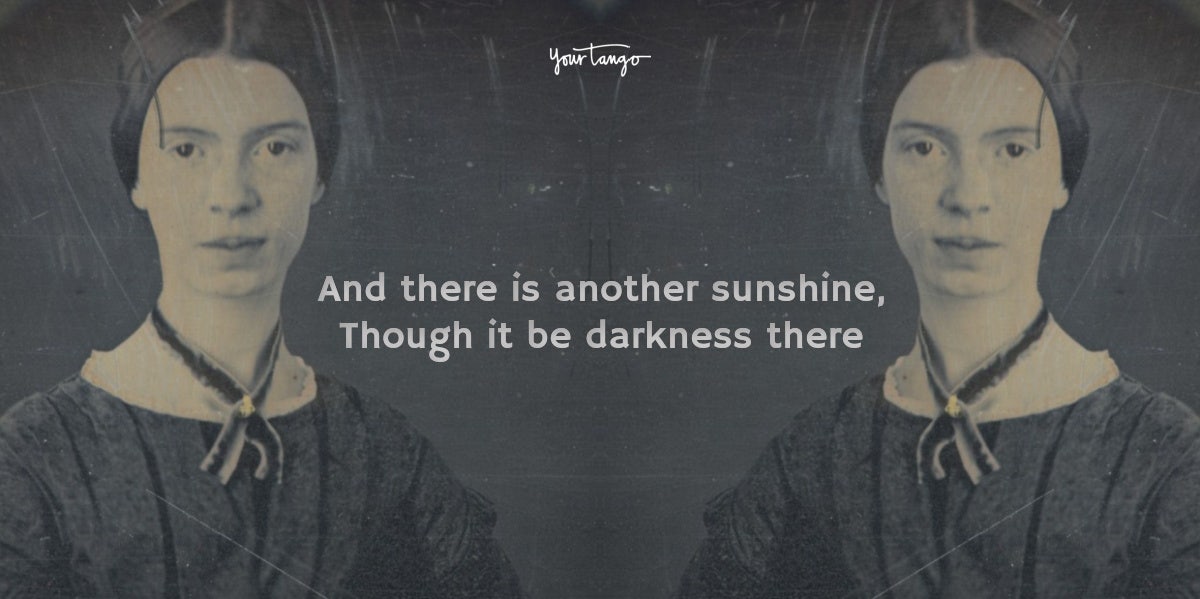 Unknown author, Public domain, via Wikimedia Commons
Unknown author, Public domain, via Wikimedia Commons Emily Dickinson, whose birthday was December 10, 1830, was a poet known for her reclusive lifestyle.
Many of us today, being increasingly reclusive ourselves, have grown to appreciate the incredible woman more and more over time.
Dickinson was a 19th-century baddie who forged her own path despite societal pressures to become a wife and mother and nothing else. She was formally educated, had a mind for literature and science, and was in love with her brother’s wife — heartbreaking, I know. She used her wit and intellect to do as she pleased and tell everyone to get out of her way.
Dickinson knew what it was like to want to be out in the world while unable to venture out there. And in her poetry, we can find solace reading of her own experiences and the ways she challenged her depressive thoughts.
Dickinson wrote poems in playful tones, introspective tones, and sometimes depressive tones. So no matter your current mood, there is sure to be a quote from one of Emily Dickinson's poems you can relate to and that will help you think and feel in new dimensions.
Her agony over her isolation is easily translated into the woes commonly felt during coronavirus quarantine. Dickinson’s hope for freedom from her numerous metaphorical prisons can give us hope for freedom from ours. And she can teach us so much about the limitlessness of our minds. It is our minds that will free us.
20 Emily Dickinson Quotes From Her Best Poems
1. "There is another sunshine, Though it be darkness there." — from "There is Another Sky"
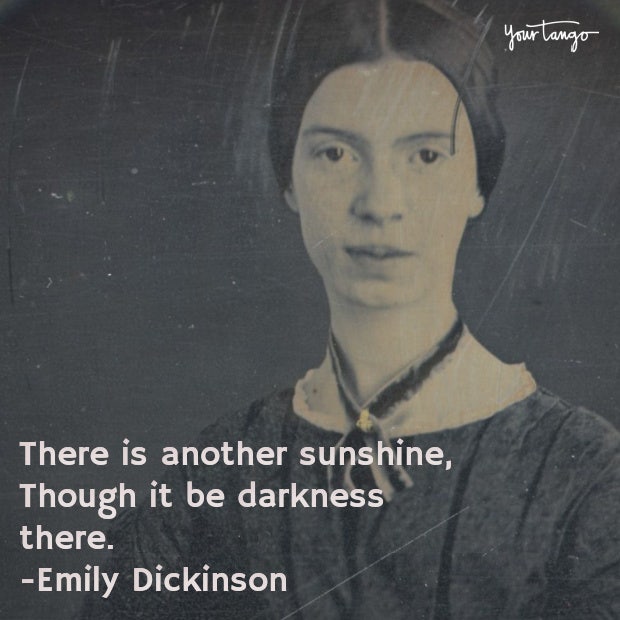 Photo: Unknown author, Public domain, via Wikimedia Commons
Photo: Unknown author, Public domain, via Wikimedia Commons
In this poem, Dickinson writes about hope for the future. No matter how bad things may seem, there is always another day, another place, another sky.
There is another sky,
Ever serene and fair,
And there is another sunshine,
Though it be darkness there;
Never mind faded forests, Austin,
Never mind silent fields -
Here is a little forest,
Whose leaf is ever green;
Here is a brighter garden,
Where not a frost has been;
In its unfading flowers
I hear the bright bee hum:
Prithee, my brother,
Into my garden come!
2. "In the peaceful west Many the sails at rest — The anchors fast — Thither I pilot thee" — from "On This Wondrous Sea"
Dickinson writes often about the sea and how vast it is compared to the confines of her house. The sea is a dreamscape for her mind to stretch the expanses of the earth where her feet will not take her.
This poem takes us on a journey with her from our own sofas and beds to the serenity and wonder of the seas.
On this wondrous sea
Sailing silently,
Ho! Pilot, ho!
Knowest thou the shore
Where no breakers roar —
Where the storm is o'er?
In the peaceful west
Many the sails at rest —
The anchors fast —
Thither I pilot thee —
Land Ho! Eternity!
Ashore at last!
3. "Twice have I stood a beggar Before the door of God! Angels, twice descending, Reimbursed my store." — from "I Never Lost as Much but Twice"
Dickinson's life was consumed by being isolated and alone. This poem identifies her frustration and loneliness.
I never lost as much but twice
And that was in the sod.
Twice have I stood a beggar
Before the door of God!
Angels, twice descending,
Reimbursed my store.
Burglar, banker, father,
I am poor once more!
4. "In a serener Bright, In a more golden light I see Each little doubt and fear, Each little discord here Removed." — from "I Have a Bird in Spring"
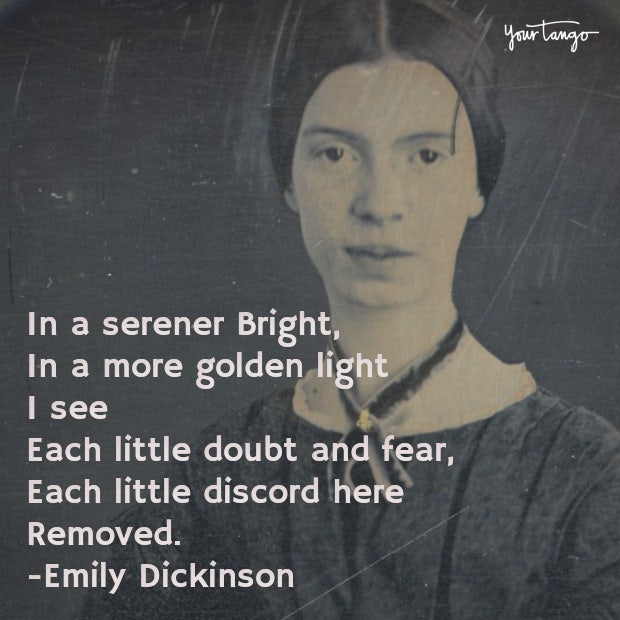 Photo: Unknown author, Public domain, via Wikimedia Commons
Photo: Unknown author, Public domain, via Wikimedia Commons
Outside her window, Dickinson observes the changing of the seasons and relates them to the changes she sees in the world and the people around her. Despite her family leading active lives and traveling away from the hometown that she never leaves, Dickinson knows that they will return someday.
Everything happens in cycles; what goes down must come back up.
I have a Bird in spring
Which for myself doth sing –
The spring decoys.
And as the summer nears –
And as the Rose appears,
Robin is gone.
Yet do I not repine
Knowing that Bird of mine
Though flown –
Learneth beyond the sea
Melody new for me
And will return.
Fast in safer hand
Held in a truer Land
Are mine –
And though they now depart,
Tell I my doubting heart
They're thine.
In a serener Bright,
In a more golden light
I see
Each little doubt and fear,
Each little discord here
Removed.
Then will I not repine,
Knowing that Bird of mine
Though flown
Shall in distant tree
Bright melody for me
Return.
5. So when you are tired — Or perplexed —or cold — Trust the loving promise Underneath the mould," — from "I Often Passed the Village"
Read this one before the walks you take to ward off cabin fever. Dickinson paints a quiet, still scene of a village she passed by many times before.
I often passed the village
When going home from school —
And wondered what they did there —
And why it was so still —
I did not know the year then —
In which my call would come —
Earlier, by the Dial,
Than the rest have gone.
It's stiller than the sundown.
It's cooler than the dawn —
The Daisies dare to come here —
And birds can flutter down —
So when you are tired —
Or perplexed —or cold —
Trust the loving promise
Underneath the mould,
Cry 'it's I,' 'take Dollie,'
And I will enfold!
6. "In this short life that lasts only an hour... How much – how little – is within our power"
In this short poem, Dickinson contemplates her agency over her life. Time alone is a perfect time for introspection and this poem — as well as the others on this list — provokes the mind to do such work.
In this short Life that only lasts an hour
How much – how little – is within our power
7. "Lest I should be old fashioned I’ll put a trinket on." — from "The Morns are Meeker Than They Were —"
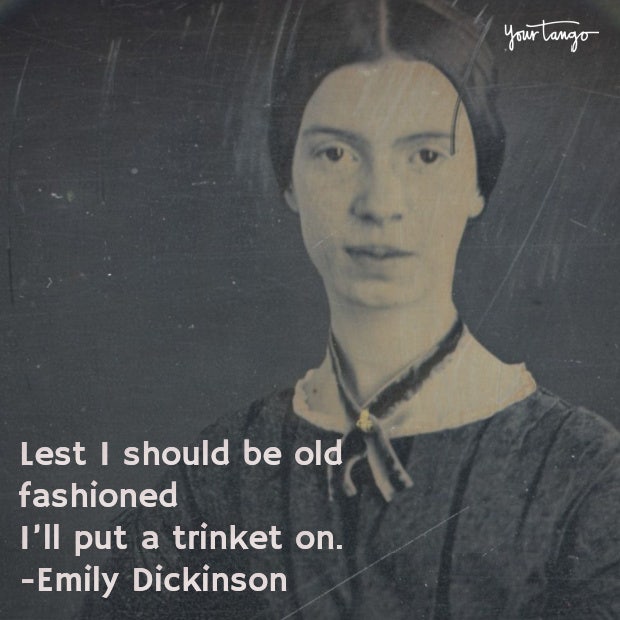 Photo: Unknown author, Public domain, via Wikimedia Commons
Photo: Unknown author, Public domain, via Wikimedia Commons
Nature is used as a character in many of Dickinson’s poems. In nature, she finds tranquility, spirituality, and exploration.
In this poem, Dickinson marvels at nature’s beauty and concludes that she must get dressed up so as not to feel underdressed in the company of the Massachusetts woods.
The morns are meeker than they were -
The nuts are getting brown -
The berry’s cheek is plumper -
The rose is out of town.
The maple wears a gayer scarf -
The field a scarlet gown -
Lest I sh'd be old-fashioned
I’ll put a trinket on.
8. "Could themself have peeped –And seen my Brain – go round –They might as wise have lodged a BirdFor Treason – in the Pound." — from "They Shut Me Up in Prose"
Dickinson uses this poem as an outlet for her anger at the patriarchy. She doesn’t want to be told who to be or what to do, and neither do you!
They shut me up in Prose –
As when a little Girl
They put me in the Closet –
Because they liked me 'still' –
Still! Could themself have peeped –
And seen my Brain – go round –
They might as wise have lodged a Bird
For Treason – in the Pound –
Himself has but to will
And easy as a Star
Look down opon Captivity –
And laugh – No more have I –
9. "It just reminded me — 'twas all — And came my way no more." — from "A Thought Went Up My Mind Today"
Ruminating thoughts are too easy to sink into, but this poem reminds us of the power of mindfulness. Dickinson lets the thought enter her mind without judgment then she lets it go, like watching a leaf on a stream.
A Thought went up my mind today —
That I have had before —
But did not finish — some way back —
I could not fix the Year —
Nor where it went — nor why it came
The second time to me —
Nor definitely, what it was —
Have I the Art to say —
But somewhere — in my Soul — I know —
I've met the Thing before —
It just reminded me — 'twas all —
And came my way no more —
10. "The Soul unto itself Is an imperial friend, Or the most agonizing Spy an Enemy could send." — from "The Soul Unto Itself"
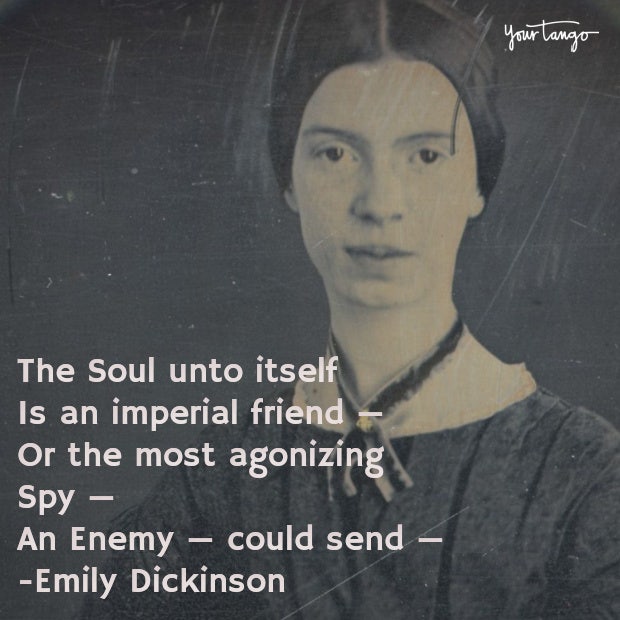 Photo: Unknown author, Public domain, via Wikimedia Commons
Photo: Unknown author, Public domain, via Wikimedia Commons
When spending so much time with ourselves, we can become our own best friend or worst enemy. Dickinson encourages us to find the wonder and appreciation for our minds and souls.
The Soul unto itself
Is an imperial friend —
Or the most agonizing Spy —
An Enemy — could send —
Secure against its own —
No treason it can fear —
Itself — its Sovereign — of itself
The Soul should stand in Awe
11. "The Liberty we knew Avoided — like a Dream, Too wide for any Night but Heaven If That — indeed — redeem." — from "A Prison Gets to Be a Friend"
The prison that Dickinson speaks about in this poem can allude to the prison of being trapped at home or to the prison of society. This poem is empathetic to the feeling that there is nothing that can be done without destroying hope for a better tomorrow.
A Prison gets to be a friend
Between its Ponderous face
And Ours — a Kinsmanship express
And in its narrow Eyes
We come to look with gratitude
For the appointed Beam
It deal us — stated as our food
And hungered for — the same
We learn to know the Planks
That answer to Our feet
So miserable a sound — at first
Nor ever now — so sweet
As plashing in the Pools
When Memory was a Boy
But a Demurer Circuit
A Geometric Joy
The Posture of the Key
That interrupt the Day
To Our Endeavor — Not so real
The Check of Liberty
As this Phantasm Steel
Whose features — Day and Night
Are present to us — as Our Own
And as escapeless — quite
The narrow Round — the Stint
The slow exchange of Hope
For something passiver — Content
Too steep for looking up
The Liberty we knew
Avoided — like a Dream
Too wide for any Night but Heaven
If That — indeed — redeem
12. "Could I but ride indefinite, As doth the Meadow Bee, And visit only where I liked, And No one visit me." — from "Could I But Ride Indefinite"
There was no stay–at–home order or Disney villain that shut Dickinson away in seclusion, but in her lonely home, she dreams of globetrotting. This poem is good for dreaming of the day when the world reopens.
Could I but ride indefinite
As doth the Meadow Bee
And visit only where I liked
And No one visit me
And flirt all Day with Buttercups
And marry whom I may
And dwell a little everywhere
Or better, run away
With no Police to follow
Or chase Him if He do
Till He should jump Peninsulas
To get away from me —
I said "But just to be a Bee"
Upon a Raft of Air
And row in Nowhere all Day long
And anchor "off the Bar"
What Liberty! So Captives deem
Who tight in Dungeons are.
13. “So from the mould, Scarlet and Gold, Many a Bulb will rise.” — from "So From the Mould"
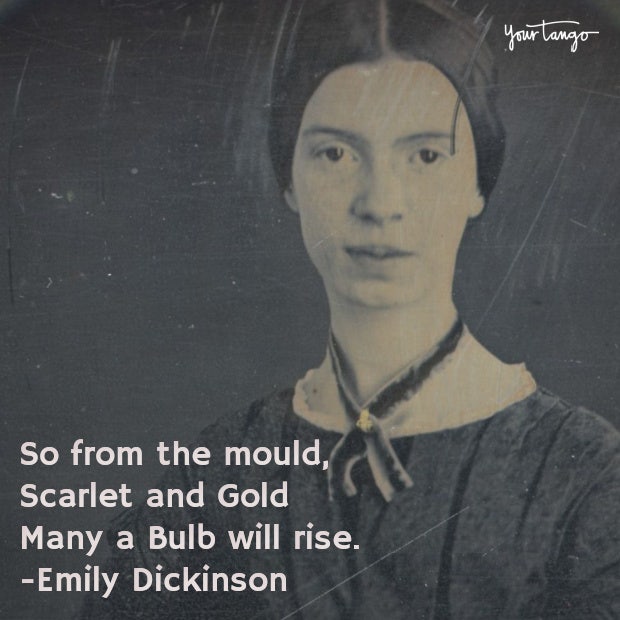 Photo: Unknown author, Public domain, via Wikimedia Commons
Photo: Unknown author, Public domain, via Wikimedia Commons
This poem is watching the exciting bloom of spring! Life rises from the dead again, and although it doesn’t always seem so, the worst times will come to an eventual end. The emotions that Dickinson brings up here is how I imagine it will feel when the time comes.
So from the mould
Scarlet and Gold
Many a Bulb will rise—
Hidden away, cunningly,
From sagacious eyes.
So from Cocoon
Many a Worm
Leap so Highland gay,
Peasants like me,
Peasants like Thee
Gaze perplexedly!
14. "The Brain is just the weight of God." — from "The Brain — is Wider Than the Sky —"
Even though we can’t go to many places in the current condition of the country, imagination is limitless. Dickinson chose to seclude herself, but her wanderlust is not lost. When you’re feeling stir-crazy, search for the places in your mind that you have never gone before.
The Brain—is wider than the Sky—
For—put them side by side—
The one the other will contain
With ease—and you—beside—
The Brain is deeper than the sea—
For—hold them—Blue to Blue—
The one the other will absorb—
As sponges—Buckets—do—
The Brain is just the weight of God—
For—Heft them—Pound for Pound—
And they will differ—if they do—
As Syllable from Sound—
15. "I think to Live — may be a Bliss, To those who dare to try." — from "I Think to Live — May Be a Bliss"
Despite her reclusive lifestyle, Dickinson writes often about seizing the day. She does as she pleases and is her own person no matter the societal pressures put upon her to be somebody else.
I think to Live — may be a Bliss
To those who dare to try —
Beyond my limit to conceive —
My lip — to testify —
I think the Heart I former wore
Could widen — till to me
The Other, like the little Bank
Appear — unto the Sea —
I think the Days — could every one
In Ordination stand —
And Majesty — be easier —
Than an inferior kind —
No numb alarm — lest Difference come —
No Goblin — on the Bloom —
No start in Apprehension's Ear,
No Bankruptcy — no Doom —
But Certainties of Sun —
Midsummer — in the Mind —
A steadfast South — upon the Soul —
Her Polar time — behind —
The Vision — pondered long —
So plausible becomes
That I esteem the fiction — real —
The Real — fictitious seems —
How bountiful the Dream —
What Plenty — it would be —
Had all my Life but been Mistake
Just rectified — in Thee
16. “To comprehend a nectar Requires sorest need.” — from "Success is Counted Sweetest"
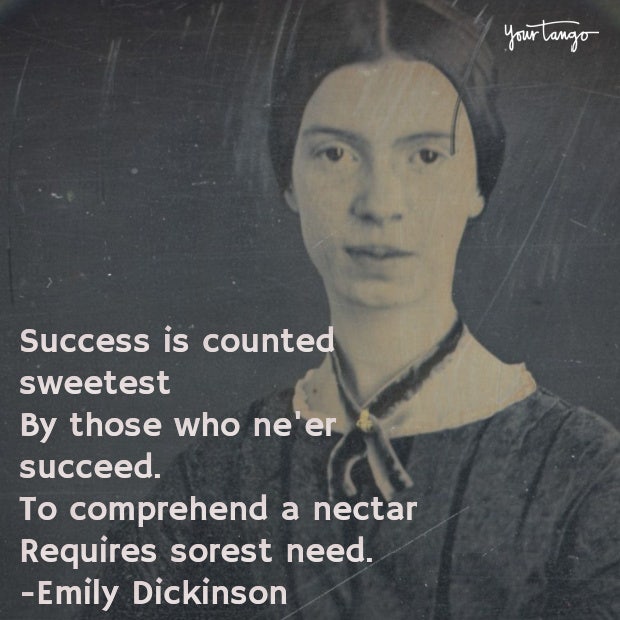 Photo: Unknown author, Public domain, via Wikimedia Commons
Photo: Unknown author, Public domain, via Wikimedia Commons
Dickinson reminds us that success and well–being hits different after adversity.
Success is counted sweetest
By those who ne'er succeed.
To comprehend a nectar
Requires sorest need.
Not one of all the purple Host
Who took the Flag today
Can tell the definition
So clear of victory
As he defeated – dying –
On whose forbidden ear
The distant strains of triumph
Burst agonized and clear!
17. “But I tug childish at my bars Only to fail again!” — from "I Never Hear the Word 'Escape'"
This poem lets you feel your feelings about being stuck. Even when you know it is for the best or that you will eventually find your way forward, you’re still allowed to feel those less than pleasant feelings about it.
I never hear the word “Escape”
Without a quicker blood,
A sudden expectation –
A flying attitude!
I never hear of prisons broad
By soldiers battered down,
But I tug childish at my bars
Only to fail again!
18. "Please to tell a little Pilgrim Where the place called 'Morning' lies!" — from "Will There Really Be a 'Morning'"
In this poem, Dickinson is waiting for a new change to come. She feels stuck in her secluded life and is looking for something to inspire her.
Will there really be a 'Morning'?
Is there such a thing as 'Day'?
Could I see it from the mountains
If I were as tall as they?
Has it feet like Water lilies?
Has it feathers like a Bird?
Is it brought from famous countries
Of which I have never heard?
Oh some Scholar! Oh some Sailor!
Oh some Wise Men from the skies!
Please to tell a little Pilgrim
Where the place called 'Morning' lies!
19. "Assent and you are sane, Demur - you’re straightway dangerous, And handled with a Chain" — from "Much Madness is Divinest Sense"
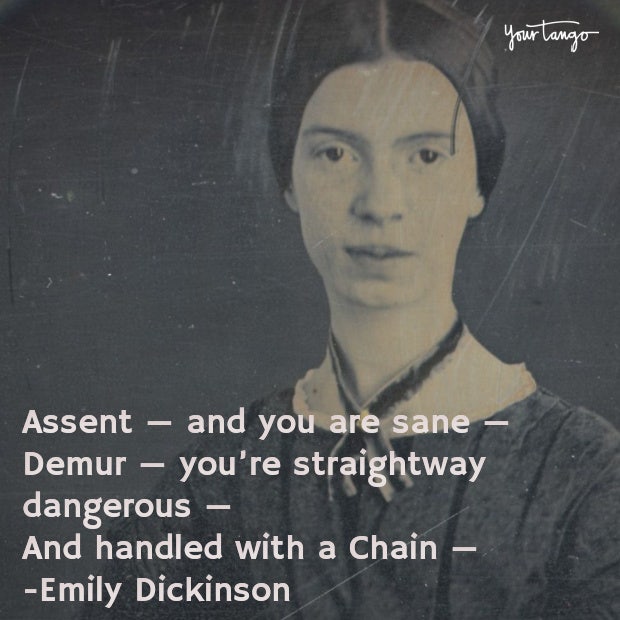 Photo: Unknown author, Public domain, via Wikimedia Commons
Photo: Unknown author, Public domain, via Wikimedia Commons
In difficult times, it can be easy to start to feel a little crazy. But, as Dickinson points out, those spells of madness can create clarity.
Much Madness is divinest Sense —
To a discerning Eye —
Much Sense — the starkest Madness —
’Tis the Majority
In this, as all, prevail —
Assent — and you are sane —
Demur — you’re straightway dangerous —
And handled with a Chain —
20. "There's a certain Slant of light, Winter Afternoons - That oppresses, like the Heft Of Cathedral Tunes." — from "There’s a Certain Slant of Light"
In stillness, ordinary objects and sights take on a new meaning. They can remind us of past people, feelings, and events and provide new insights.
Dickinson reflects upon her beliefs and emotions by staring at light coming in through a window.
There's a certain Slant of light,
Winter Afternoons –
That oppresses, like the Heft
Of Cathedral Tunes –
Heavenly Hurt, it gives us –
We can find no scar,
But internal difference –
Where the Meanings, are –
None may teach it – Any –
'Tis the seal Despair –
An imperial affliction
Sent us of the Air –
When it comes, the Landscape listens –
Shadows – hold their breath –
When it goes, 'tis like the Distance
On the look of Death –
Colleen Fogarty is a writer who covers self-care, astrology, and relationship topics.

